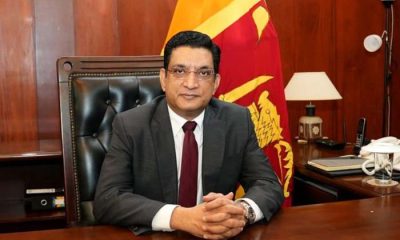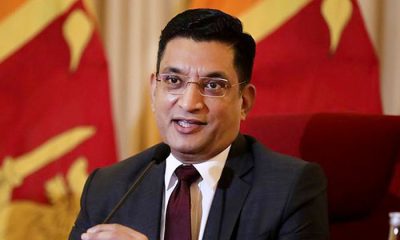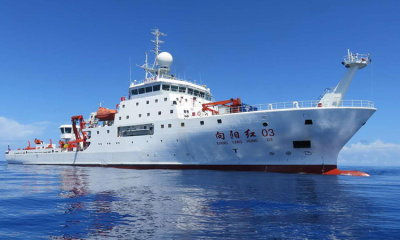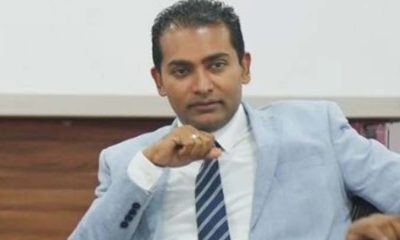News
Sri Lanka thwarts bid to alter vital maritime route – Foreign Minister Sabry
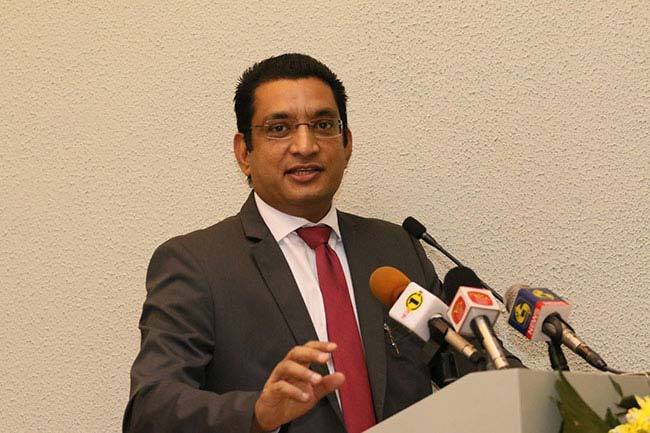
By Saman Indrajith
Sri Lanka had managed to thwart an attempt by various international agencies, driven by geostrategic motives, to alter Sri Lanka’s Vessel Traffic Separation Scheme (TSS), as Foreign Minister Ali Sabry informed Parliament on Thursday (07).
The TSS, positioned south of Dondra Head, stands as a crucial trade route and one of the world’s busiest maritime trade corridors. Minister Sabry emphasized that any changes to this scheme would have undermined the significance of Galle and Hambantota Ports.
“We collaborated with China, Egypt, Algeria, India, and Pakistan to defeat this proposal. We successfully removed it from the agenda of the International Maritime Organization (IMO). Only Canada opposed us, driven by political reasons. The support we receive from the Global South reflects our commitment to the right path,” he stated.
Minister Sabry highlighted Sri Lanka’s primary challenge: to refrain from being perceived as aligned with any single power.He further noted the operational constraints within the Foreign Ministry, citing the recent diplomatic tension between India and Canada, revealing that the Indian High Commission in Canada maintains a staff of over 70.
“Yet, across 55 countries and within Sri Lanka, our staff totals 168. While India remains crucial, we have merely six personnel there. Our sanctioned workforce is 264, and we haven’t recruited since 2018. We’ve now initiated a recruitment campaign and need an ongoing mechanism for yearly hires. We strive to make the most of our resources,” he emphasized.
In 2020, the Ministry was inundated with requests to authenticate 125,000 documents from Sri Lankans seeking to depart the country.
“We allocated 100 million rupees for this service. By 2022, we authenticated 527,000 documents, generating 400 million rupees in revenue, all accomplished with the same staff,” Minister Sabry added.
He also highlighted the implementation of a digital mechanism in 2022, eradicating the long-standing queues at the Foreign Ministry. Now, individuals can upload educational documents online for authentication without the need for physical visits. “This achievement owes credit to our officials and my State Minister,” he acknowledged.
Additionally, Minister Sabry addressed concerns about the arrival of Chinese research vessels. “To allay these concerns, we’ve formulated Standard Operating Procedures (SOPs), approved by the Cabinet and distributed to countries that have sent ships over the past decade. A structured mechanism is now in place,” he assured.
Following the speech, Samagi Jana Balawegaya (SJB) MP Harsha de Silva attributed the establishment of the Extension of Electronic Document Attestation System (e-DAS) to the previous government in 2018. Therefore, credit for instituting the online document certification system must be given to those who introduced e-DAS, he remarked.
State Minister of Foreign Affairs Tharaka Balasuriya acknowledged that the e-DAS system was indeed initiated by the previous government. Their contribution lay in integrating several relevant institutions into the system.
News
CEB engineers raise alarm over power sector stability

A senior electrical engineers attached to the Ceylon Electricity Board (CEB) have warned that unresolved structural and policy issues within the power sector could threaten the long-term stability of the national grid, urging authorities to act swiftly to address mounting technical and administrative concerns.
Speaking on condition of anonymity, they said the electricity network was operating under increasing strain due to delayed infrastructure upgrades, financial constraints, and growing demand.
“The national grid is not something that can be managed casually. It requires systematic planning, preventive maintenance, and timely investment. If these are compromised, the risk to system stability increases,” the engineers said.
They noted that several transmission and substation modernisation projects were behind schedule, while ageing thermal plants continued to shoulder a significant portion of the country’s base load demand.
“Engineers are committed to ensuring an uninterrupted supply. But professional expertise must be respected in decision-making. Technical matters cannot be subjected to short-term political considerations,” the engineers added.
Meanwhile, the powerful Ceylon Electricity Board Engineers’ Union (CEBEU) echoed similar concerns, warning that failure to address long standing professional and structural issues could have serious consequences for the power sector.
In a statement, the CEBEU has said that engineers have repeatedly called for reforms that safeguard the integrity of the utility and ensure that operational decisions remain grounded in technical evaluation.
“The electricity sector is a critical national asset. Any attempt to weaken institutional safeguards or bypass professional consultation will directly impact service reliability and long-term sustainability,” the union said.
The CEBEU has stressed the importance of transparent engagement between policymakers and technical personnel, noting that morale among engineers could be affected if their concerns continue to go unheard.
Industry analysts point out that the power sector plays a central role in Sri Lanka’s economic recovery efforts, particularly as the country seeks to expand industrial activity and attract investment. Stability in electricity supply remains a key determinant of business confidence.
The senior engineer stressed d that the objective of raising concerns is not confrontation but preservation of the grid’s integrity.
“Our responsibility is to the public. Electricity powers hospitals, industries, and homes. Safeguarding the system is a national duty,” he said.
With tensions simmering within the sector, stakeholders say meaningful dialogue between authorities, engineers, and trade unions will be crucial in ensuring that Sri Lanka’s power infrastructure remains resilient in the face of growing challenges.
By Ifham Nizam
News
CB identifies 24 pyramid scams in Sri Lanka
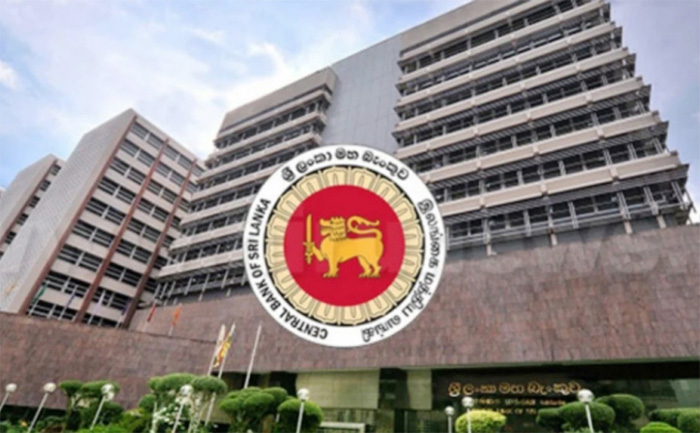
The Central Bank (CBSL) yesterday announced that investigations had identified 24 companies and applications operating prohibited pyramid schemes.
In a public notice issued under Section 83C of the Banking Act, No. 30 of 1988 (as amended), the CBSL said the following entities had been “ascertained and determined as prohibited schemes”: Tiens Lanka Health Care (Pvt) Ltd, Best Life International (Pvt) Ltd, Mark–Wo International (Pvt) Ltd, V M L International (Pvt) Ltd, Global Lifestyle Lanka (Pvt) Ltd, Fast3Cycle International (Pvt) Ltd, Sport Chain App / Sport Chain ZS Society Sri Lanka, OnmaxDT, MTFE App / MTFE SL Group / MTFE Success Lanka / MTFE DSCC Group, Fastwin (Pvt) Ltd, Fruugo Online App / Fruugo Online (Pvt) Ltd, Ride to Three Freedom (Pvt) Ltd, Qnet / Questnet, Era Miracle (Pvt) Ltd and Genesis Business School, Ledger Block, Isimaga International (Pvt) Ltd, Beecoin App and Sunbird Foundation, Windex Trading, The Enrich Life (Pvt) Ltd, Smart Win Entrepreneur (Pvt) Ltd, Net Fore International (Pvt) Ltd / Netrrix, Pro Care (Pvt) Ltd and Shade of Procare (Pvt) Ltd, SGO / sgomine.com and I.C.A.N Advertising (Pvt) Ltd and its affiliates icanonlineadvertising.com, bannercuts.com, bannercuts.lk, bannercuts.net and bannercuts.org
The CBSL said pyramid schemes, also referred to as multi-level marketing or direct selling schemes in certain instances, operate as recruitment-based programmes in which members enlist others into an expanding “downline” structure resembling a chain letter.
Under such arrangements, a portion of the fees paid by new recruits is channelled upwards to earlier participants, known as the “upline”, who are fewer in number.
The Central Bank warned that such schemes are inherently unsustainable, with the vast majority of participants at the lower tiers eventually losing their investments, while only a small number of early entrants are able to recover or profit from the funds contributed by subsequent recruits. It noted that when a pyramid scheme collapses, up to 99 per cent of those in the lower levels risk losing their money.
News
Church urges patience, warns against interference with Easter attacks probe
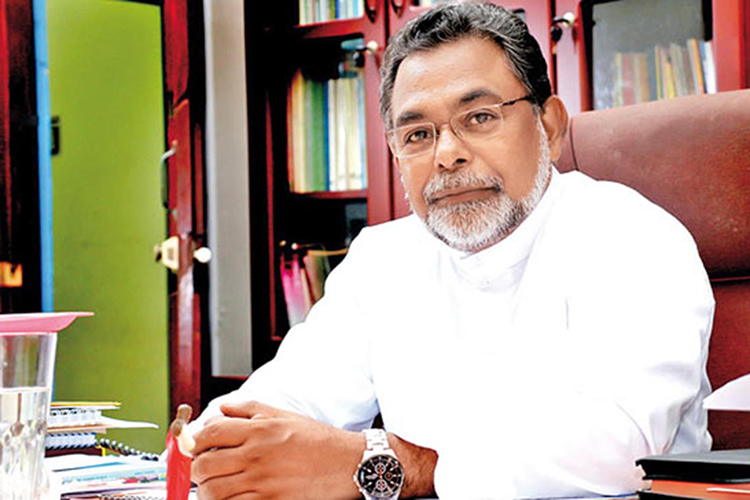
Director of Communications for the Archdiocese of Colombo, Rev. Fr. Cyril Gamini Fernando, yesterday expressed confidence that ongoing investigations into the 2019 Easter Sunday terror attacks would yield meaningful results and urged the public and all stakeholders to exercise patience and allow the probe to proceed independently.
Addressing a media briefing in Colombo yesterday, Fr. Fernando called on all parties to refrain from interfering with the investigations, warning that any attempt to obstruct the process would amount to a grave injustice to the victims.
He said he believed there was credible evidence to warrant the arrest of military intelligence veteran Maj. Gen. (Retd.) Suresh Sallay.
Referring to the coordinated bombings on April 21, 2019, which targeted churches and hotels and claimed nearly 300 lives, Fr. Fernando described the attacks as a “barbaric” act and a “massacre” that killed worshippers attending Easter services as well as individuals from different religious and ethnic communities.
By Norman Palihawadane
-

 Features6 days ago
Features6 days agoWhy does the state threaten Its people with yet another anti-terror law?
-

 Features6 days ago
Features6 days agoReconciliation, Mood of the Nation and the NPP Government
-

 Features6 days ago
Features6 days agoVictor Melder turns 90: Railwayman and bibliophile extraordinary
-

 Features5 days ago
Features5 days agoLOVEABLE BUT LETHAL: When four-legged stars remind us of a silent killer
-

 Features6 days ago
Features6 days agoVictor, the Friend of the Foreign Press
-

 Latest News7 days ago
Latest News7 days agoTariffs ruling is major blow to Trump’s second-term agenda
-

 Business5 days ago
Business5 days agoSeeing is believing – the silent scale behind SriLankan’s ground operation
-

 Business5 days ago
Business5 days agoBathiya & Santhush make a strategic bet on Colombo


